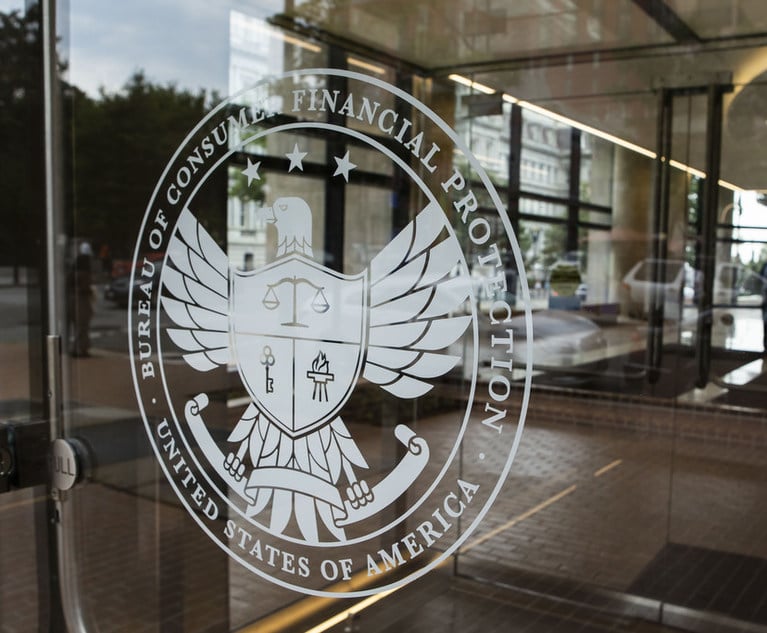 Consumer Financial Protection Bureau headquarters in Washington, D.C.
Consumer Financial Protection Bureau headquarters in Washington, D.C. Chopra's Deputies: State Attorneys General and Consumer Protection
The new Director is seeking to flex and strengthen all of CFPB's dormant muscles.
June 08, 2022 at 12:15 PM
9 minute read
In May 2022, the Consumer Financial Protection Bureau (CFPB) did something rare for federal agencies: It declared that state attorneys general have broader authority to enforce certain federal laws than does the federal government itself. CFPB's declaration came in the form of an interpretive ruling that instructed states of their ability to enforce the Consumer Financial Protection Act (CFPA) free from limitations, like industry carve outs, that apply to CFPB.
Although the ability for states to enforce the CFPA is as old as the Act itself and has been used on occasion, the new interpretation highlights a crucial consideration for businesses whose activities fall within the ambit of the CFPA's consumer financial protections. Under President Biden, CFPB Director Rohit Chopra has forcefully returned CFPB to prominence through high-profile subpoenas to big tech companies, the unwinding of COVID-measures that gave companies regulatory flexibility, and the expansion of CFPB's strongest tool—its power to target Unfair, Deceptive and Abusive Acts and Practices (UDAAP). The new Director is seeking to flex and strengthen all of CFPB's dormant muscles. This is a significant shift from the Trump CFPB, which focused on rolling-back rulemaking, relaxing enforcement priorities to target more hard and true violators, and providing clarity to industry participants on the rule of law. And now, CFPB seeks to recruit to its mission the 50 states to enforce federal protections.
This content has been archived. It is available through our partners, LexisNexis® and Bloomberg Law.
To view this content, please continue to their sites.
Not a Lexis Subscriber?
Subscribe Now
Not a Bloomberg Law Subscriber?
Subscribe Now
NOT FOR REPRINT
© 2025 ALM Global, LLC, All Rights Reserved. Request academic re-use from www.copyright.com. All other uses, submit a request to [email protected]. For more information visit Asset & Logo Licensing.
You Might Like
View All
What Businesses Need to Know About Anticipated FTC Leadership Changes
7 minute read
The CFPB Is Digging In for Last Days of Biden's Term. But What Happens Next?
6 minute read
JetBlue Airways Will Pay $2M to Settle DOT Charges of Chronically Delayed Flights
Trending Stories
- 1Plaintiff Argues Jury's $22M Punitive Damages Finding Undermines J&J's Talc Trial Win
- 2Bannon's Fraud Trial Delayed One Week as New, 'More Aggressive,' Defense Attorneys Get Ready
- 3'AI-Generated' Case References? This African Law Firm Is Under Investigation
- 4John Deere Annual Meeting Offers Peek Into DEI Strife That Looms for Companies Nationwide
- 5Why Associates in This Growing Legal Market Are Leaving Their Firms
Who Got The Work
J. Brugh Lower of Gibbons has entered an appearance for industrial equipment supplier Devco Corporation in a pending trademark infringement lawsuit. The suit, accusing the defendant of selling knock-off Graco products, was filed Dec. 18 in New Jersey District Court by Rivkin Radler on behalf of Graco Inc. and Graco Minnesota. The case, assigned to U.S. District Judge Zahid N. Quraishi, is 3:24-cv-11294, Graco Inc. et al v. Devco Corporation.
Who Got The Work
Rebecca Maller-Stein and Kent A. Yalowitz of Arnold & Porter Kaye Scholer have entered their appearances for Hanaco Venture Capital and its executives, Lior Prosor and David Frankel, in a pending securities lawsuit. The action, filed on Dec. 24 in New York Southern District Court by Zell, Aron & Co. on behalf of Goldeneye Advisors, accuses the defendants of negligently and fraudulently managing the plaintiff's $1 million investment. The case, assigned to U.S. District Judge Vernon S. Broderick, is 1:24-cv-09918, Goldeneye Advisors, LLC v. Hanaco Venture Capital, Ltd. et al.
Who Got The Work
Attorneys from A&O Shearman has stepped in as defense counsel for Toronto-Dominion Bank and other defendants in a pending securities class action. The suit, filed Dec. 11 in New York Southern District Court by Bleichmar Fonti & Auld, accuses the defendants of concealing the bank's 'pervasive' deficiencies in regards to its compliance with the Bank Secrecy Act and the quality of its anti-money laundering controls. The case, assigned to U.S. District Judge Arun Subramanian, is 1:24-cv-09445, Gonzalez v. The Toronto-Dominion Bank et al.
Who Got The Work
Crown Castle International, a Pennsylvania company providing shared communications infrastructure, has turned to Luke D. Wolf of Gordon Rees Scully Mansukhani to fend off a pending breach-of-contract lawsuit. The court action, filed Nov. 25 in Michigan Eastern District Court by Hooper Hathaway PC on behalf of The Town Residences LLC, accuses Crown Castle of failing to transfer approximately $30,000 in utility payments from T-Mobile in breach of a roof-top lease and assignment agreement. The case, assigned to U.S. District Judge Susan K. Declercq, is 2:24-cv-13131, The Town Residences LLC v. T-Mobile US, Inc. et al.
Who Got The Work
Wilfred P. Coronato and Daniel M. Schwartz of McCarter & English have stepped in as defense counsel to Electrolux Home Products Inc. in a pending product liability lawsuit. The court action, filed Nov. 26 in New York Eastern District Court by Poulos Lopiccolo PC and Nagel Rice LLP on behalf of David Stern, alleges that the defendant's refrigerators’ drawers and shelving repeatedly break and fall apart within months after purchase. The case, assigned to U.S. District Judge Joan M. Azrack, is 2:24-cv-08204, Stern v. Electrolux Home Products, Inc.
Featured Firms
Law Offices of Gary Martin Hays & Associates, P.C.
(470) 294-1674
Law Offices of Mark E. Salomone
(857) 444-6468
Smith & Hassler
(713) 739-1250







